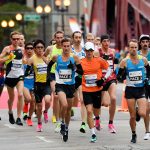About Us
Ethiopian legend Abebe Bikila was Africa’s first world record breaking athlete/ marathoner and first Ethiopian and first sub-Saharan African Olympic gold medalist. He would also become Africa’s first Olympic double-gold medalist and double world-breaking athlete. No one else in the world has won two Olympic gold medals in the marathon, while simultaneously breaking the world record! The statistics and the honors go on and on, and many structures and trophies exist in honor of the infinitely memorable Abebe Bikila.
To many, Bikila was Africa’ overall first Olympic marathon gold medalist. However the continental African Alain Mimoun (Alain Mimoun O’Kacha) of Algeria which was then a colony of France won the marathon gold medal at the previous Olympics held in Melbourne in 1956. Mimoun was listed as a competitor for France throughout his legendary running career during which he won one Olympic gold medal, three Olympic silver medals, and four Mediterranean Games gold medals. And even before Mimoun, there was Algeria-born Ahmed Boughera el Ouafi who won the Olympic marathon gold in Amsterdam in Amsterdam but considered himself French. The 1956 Olympic win by Mimoun brought back the spotlight on Boughera El Ouafi who was then miring in poverty!
At the 1960 Olympic Games in Rome on September 10th, Bikila who had previously never ran the marathon outside Ethiopia, and did not start running competitively until he was 24 years old, completed the course in the world record 2hrs-15min:16.2secs. The previous world record was held by Sergei Popov (2-15:17.0) of the Soviet Union. The Rome 1960 marathon course was quite trying given that Bikila’s bare feet had to contend with the heavily cobble-stoned Rome roads. Further, because of the heat, the race began at sunset and even had to be guided by Rome’s armed forces holding up torches in the dark. Aforementioned previous Olympic marathon champion Alain Mimoun, aged 39, finished 34th in 2-31:20.0. As the winner in Melbourne, 35 year-old Mimoun had finished in a relatively slow 2-25:00
Abebe Bikila was born on August 7th 1932 in Jato Village in the Semien Shewa (~North Shewa) zone of the province Amhara in Ethiopia. As a competitive runner Bikila was approximately 130 pounds (60 kg), very slender at a tall 5′ 10″ (1.77m). The son of an Oromo shepherd, Bikila was a last-minute addition to the Ethiopian Olympic team. Bikila had moved from Jirru Village early in the 1950’s after leaving his father and rejoining his mother in Addis Ababa. Bikila became impressed by the city, and most of all the neatly dressed and precise and disciplined Imperial Bodyguards. He would join the force and became a private in 1956. Abebe had as a youngster been known to be a good swimmer, a skillful horse rider, and a guna hockey player.
About the forthcoming Olympics, the preferred 1960 marathon entrant Wami Biratu had recently suffered a broken ankle from playing soccer and Bikila was added to the national team just before the plane to Rome would leave. Legendary Mamo Wolde who would win Olympic silver/ gold and bronze, later on in the 1968 and 1972 respectively would also be an Olympian in Rome where would fourth in the 10000m finals.
As for Bikila, the last-minute inconvenience also involved the shoe sponsor Adidas not having enough shoes left to avail to athletes. The closest to his shoe-size were poorly fitting and uncomfortable that two hours before the marathon race Bikila decided to run barefooted–just like he had trained at home for the race.
For the first quarter of the race, Abebe was behind but in eye-distance the leading pack. He speeded up and after a third of the distance had caught up with the leading pack that included Aurele Vandendriessche (Van den Riessche) of Belgium, Arthur Kelly (Great Britain) and Rhadi Ben Abdesselam (Morocco). Halfway through the race, it was Rhadi and Bikila in the forefront and running side-by-side. But Abebe did not know that this was the Rhadi that he had been warned about!
Before the race, Bikila’s Finnish-Swedish trainer Major Onni Niskanen whose primary duties were to set up the Ethiopian Imperial Guard in which Bikila was a private, indicated to Bikila that one of his main rivals would be the Moroccan Rhadi who was assigned to wear “26” on his bib. However, Rhadi mysteriously did not wear his black marathon bib, and instead wore his regularly assigned track (he also competed in the 10000m) bib that was numbered “186.” Rhadi had not even been listed in the marathon program!
As the race progressed, Bikila searched and looked in the distance.for the athlete numbered “26” as he passed other athletes. Bikila had been unaware that the athlete numbered “186” and running beside to him after the two had created quite a significant lead from the rest of the pack was actually Rhadi. At three miles toward the end of the race, the two then ran alongside each other neck-to-neck. A quarter mile towards the end, Bikila unleashed a sprint for the finishing line after gaining a considerable distance from Rhadi! Bikila won by nearly 200 yards ahead of Rhadi, beating a field of 75 men. At the end of the race, Bikila still looked fresh and ran quite past the finishing line. He exercisingly stretched and jumped up and down after the race, and later claimed that he would have been capable of maintaining the same pace for ten more miles. Bikila, undoubtedly, would have lowered the world record further.





